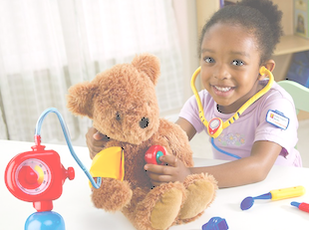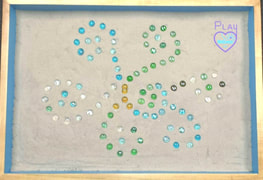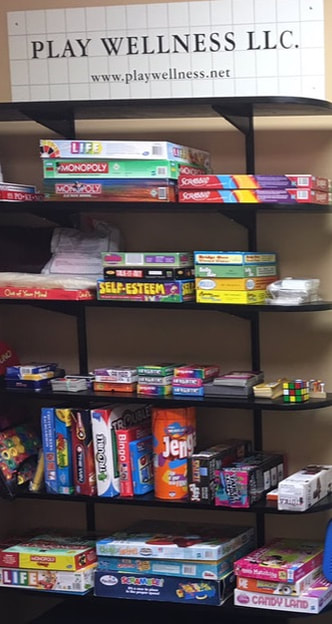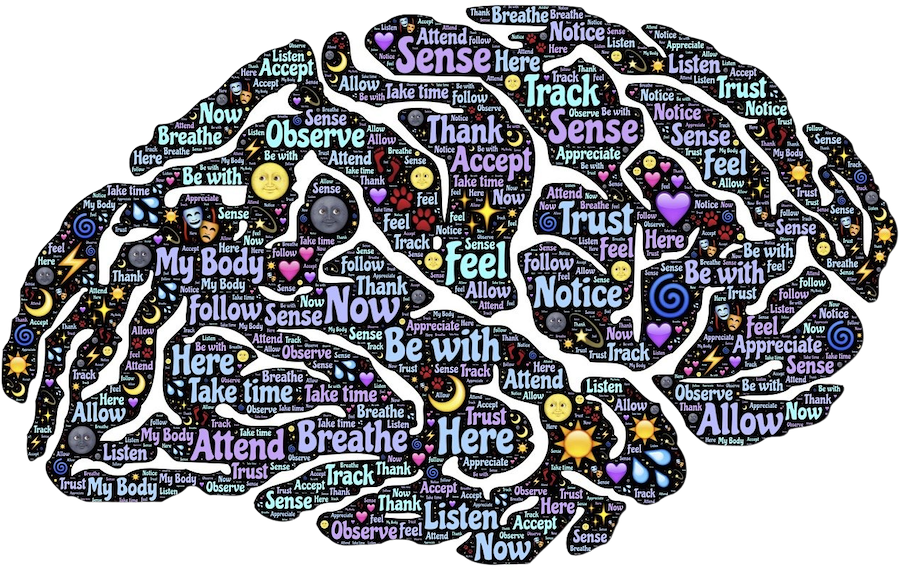In addition to traditional talk therapy, all of our clinicians are trained in at least one of the following specialized therapeutic modalities that integrates subcortical brain processing (limbic brain for emotions and brainstem for regulation) and/or are evidence-based models for treating infants, children, and parents:
- Child Parent Psychotherapy (CPP) - Ages 0-5 and their caregivers for stress and trauma (including intergenerational and cultural)
- Combined Parent-Child Cognitive Behavioral Therapy (CPC-CBT) - Ages 3-17 and caregivers for physical abuse prevention and/or intervention
- Play Therapy - Ages 4-12 with their caregivers for lots of needs
- Sand Therapy - Pre-teens/teens, adults, and families to address a variety of needs
- Game Therapy - Children, teens, families, and couples to address a variety of needs
- Brainspotting - Children, teens, and adults for nearly every need
- Theory-Based Talk Therapies - Some teens, adults, and couples to address a variety of needs
CHILD PARENT PSYCHOTHERAPY (CPP)
|
Child-Parent Psychotherapy (CPP) is evidence-based therapy treatment for caregivers and their infants, toddlers, and preschoolers. CPP was designed to enhance and repair the behavioral and mental health of young children whose most intimate relationships are disrupted by stressful experiences (Lieberman, Ghosh Ippen, & Van Horn, 2015, p.1). While respecting family and cultural values, the caregiver and his/her child are active participants in treatment to enhance a healthy relationship, build social and emotional growth, and recover from maltreatment/neglect, abuse/violence (e.g., psychological, physical, and sexual abuse, community violence, intimate partner violence) and other forms of trauma (e.g., natural disasters, medical trauma, refugee trauma, racial trauma, traumatic grief). Ultimately, we combine our knowledge and experience with the caregiver's relationship with the child.
Play Wellness provides CPP with pregnant/birthing bodies through children aged 5 to help with:
|
|
Introduction to Child-Parent Psychotherapy (2019)
|
Key relationships in the first three years of life (2016)
|
CPP Clinical Formulation Triangle (2021)
|
Ghosts and Angels in the Nursery (2020)
|
COMBINED PARENT-CHILD COGNITIVE BEHAVIORAL THERAPY (CPC-CBT)
|
Combined Parent-Child Cognitive Behavioral Therapy (CPC-CBT) is evidence-based therapy treatment for caregivers and children ages 3 to 17 designed to be a short-term, strengths-based therapy program over the course of 16-20 sessions (75-90 minutes each) to help families heal from the trauma of physical abuse, to empower parents to use non-coercive parenting strategies, and/or to strengthen the parent-child relationship to stop the cycle of violence (The National Child Traumatic Stress Network, 2015). This model involves four phases: 1) engagement and psychoeducation, 2) building effective coping skills, 3) family safety planning, and 4) abuse clarification.
CPC-CBT can be used with the following:
|
PLAY THERAPY
|
Play therapy utilizes the therapeutic powers of PLAY to help children achieve optimal mental health (APT, 2013). Play therapy was designed to enhance the mental and emotional functioning of children (ages 4-12) based on their specific developmental and cultural needs. Play Wellness has a special play space just for children! We use selected toys (which serve as their words) to help children learn and grow at their own pace and in their own language (play). Play therapy, in which some theories are evidence-based, is often used with children to enhance social and emotional growth. It can minimize symptoms related to abuse/neglect, attention deficits, aggressive behaviors, autism, anxiety, bullying (targets and bullying behaviors), chronic illness, depression, grief, oppositional defiance, post traumatic stress, reactive attachment, selective mutism, and sleeping/eating challenges. Play therapy can help children (and adults) with the following (Goldstein, 2012; Homeyer & Sweeny, 2011; Schaefer & Drewes, 2014):
|
|
|
|
To learn more about play therapy, see the Association for Play Therapy's website and view the videos below.
|
Play therapy communication (2016)
|
Play therapy with parents (2016)
|
Introduction to play therapy (2011)
|
SAND THERAPY
Sand therapy is a form of counseling that uses sandtray materials to process internal and relational issues in a non-verbal manner (Homeyer & Sweeney, 2011). Sand therapy is often helpful for individuals, couples, and families who feel stuck or who have challenges communicating or expressing themselves verbally (whether developmentally or regarding a specific event, issue, or need). Play Wellness provides non-judgmental and protected sand space that gives freedom to your unconscious mind to help you on your journey towards healing! Sand therapy can help people of all ages with (Homeyer & Sweeny, 2011):
|
Sand play therapy with children and teens (2009)
|
Overview of Sandplay Therapy (2011)
|
GAME THERAPY
|
Game therapy is a form of counseling that uses board, electronic, and other games to enhance personal and relational wellness in a safe and fun environment (Fountain, 2017). Play Wellness integrates games into counseling to promote healthy communication and interactions with teens, families, and groups. Games are selected based on therapeutic use and developmental level to enhance overall functioning and well-being. Game therapy can enhance the following (Schaefer & Cangelosi, 2016):
|
|
Brainspotting is a relational and neurological (brain/body based) treatment. Through the visual field (relevant eye positions), clients can communicate with their subcortical brain and locate the spot that accesses deeply stored memories and needs (Grand, 2013). Trapped creativity, thinking patterns, pain, trauma, grief, etc. can be released via an supportive relationship that allows clients to listen to, attune to, and regulate their brain/body messages. Brainspotting is frequently combined with BioLateral sound (regulating music). Research has shared its ability to treat anxiety, depression, emotional dysregulation, survivors of community violence, and post traumatic stress disorder (PTSD)/dissociative trauma. It is also well-known for its use with:
|
|
What is brainspotting? (2013)
|
Brainspotting for trauma, depression, anxiety (2021)
|
Technical aspects of brainspotting (2018)
|
TALK THERAPY
|
Play Wellness utilizes traditional talk / processing therapy with teens and adults who are capable of and/or prefer to verbalize their concerns and needs. Evidence-based talk therapies include Person Centered Therapy, Cognitive Behavioral Therapy (CBT), Gestalt Therapy, and Narrative Therapy. Play Wellness offers service flexibility for talk therapy, including in the office, online (telemental health), or via counseling concierge (at the office, home, or retirement community). When appropriate and with the client's agreement, talk therapy may be combined with brainspotting or non-verbal therapies (e.g., sandtray therapy, play therapy activities, game therapy) to enhance mental health care.
|










